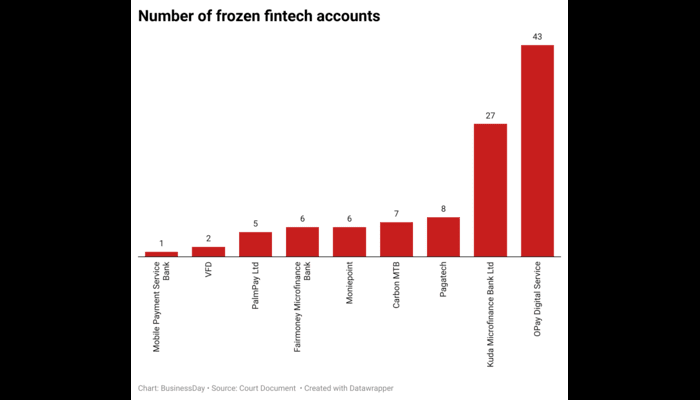Nine fintech companies have frozen 105 accounts allegedly involved in unauthorised foreign exchange dealings, money laundering, and terrorism financing.
This follows an application by the Economic and Financial Crimes Commission (EFCC) to a Federal High Court in Abuja. The court granted an interim order on April 24, 2024, to freeze the accounts for 90 days while investigations continue.
The affected fintechs and the number of accounts include Fairmoney Microfinance Bank (6), VFD (2), Kuda Microfinance Bank Ltd (27), Opay Digital Services (43), Carbon MTB (7), MoMo Payment Service Bank (1), Pagatech (8), PalmPay Ltd (5), and Moniepoint (6).
These frozen accounts are part of a larger investigation by the EFCC into 1,146 bank accounts suspected of forex racketeering. The EFCC believes that the owners of some of these accounts exploited cryptocurrency platforms to manipulate the naira’s value against the dollar.
A couple of weeks ago, the EFCC Chairman, Ola Olukoyede, told journalists that about 300 accounts had been frozen because of their connection to illegal trading on a peer-to-peer platform. He explained that over $15 billion passed through a particular (unnamed) forex platform in the last year, outside financial regulations.
Following these account freezes, several fintechs, including OPay, Moniepoint, PalmPay, and Kuda Bank, have temporarily suspended the opening of new accounts. Sources close to the matter told BusinessDay that the fintechs were directed to suspend the onboarding of new customers pending the Central Bank of Nigeria’s evaluation of its Know Your Customer process in connection with the ongoing investigation into illegal foreign exchange transactions.
A source said, “There was a meeting last week with the Office of the National Security Adviser, and we all agreed to support the government’s drive. We were one of the first to stop onboarding. However, the real issue is that most of these accounts are domiciled in commercial banks. Only about 10 percent of them are fintech accounts, and we were the ones that were asked to stop onboarding.”
